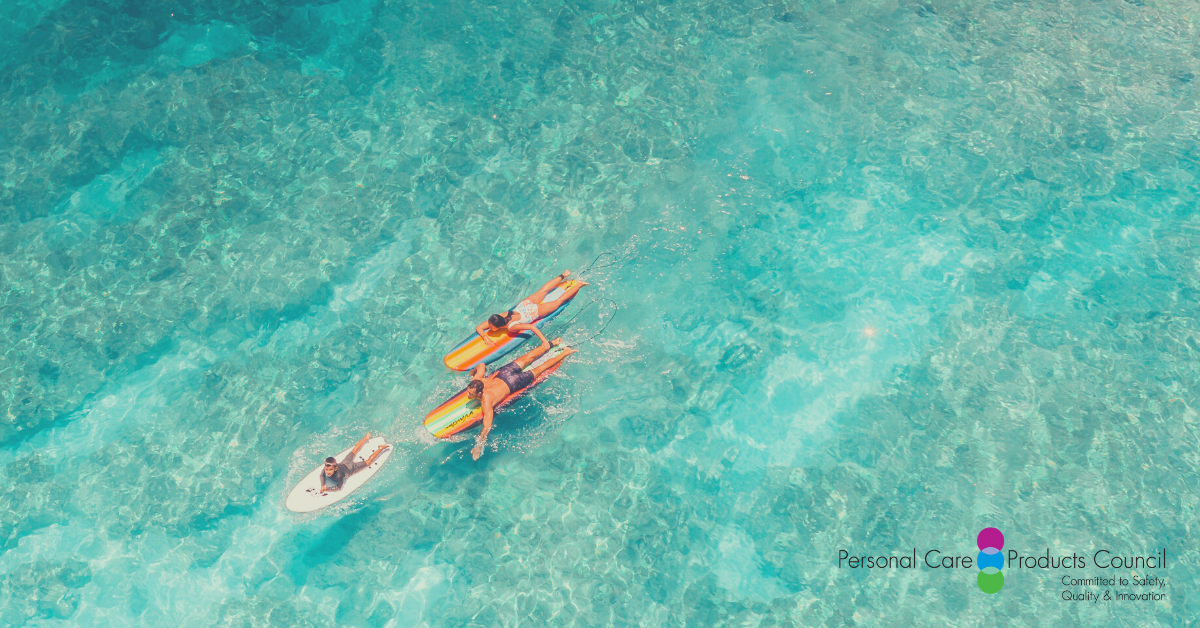Study Demonstrates Environmental Risk Assessments on Coral Reefs Are Insufficient
FOR IMMEDIATE RELEASE
CONTACTS:
Stefanie Harrington, (202) 615-6558, harringtons@personalcarecouncil.org
Jamie Kurke, (202) 258-5285, kurkej@personalcarecouncil.org
Study Demonstrates Environmental Risk Assessments on Coral Reefs Are Insufficient
Researchers Find Lack of Evidence that UV Sunscreen Filters are Significantly Impacting Corals
Washington, D.C. – A newly published critical scientific review by environmental scientists from the University of Maryland Center for Environmental Science (UMCES) Chesapeake Biological Laboratory and the Personal Care Products Council (PCPC) shows that ultraviolet (UV) sunscreen filters pose a minimal risk to coral. In addition, it underscores the need for further research to allow the scientific community to form a consensus based on reliable studies.
Carys Mitchelmore, Ph.D., professor, UMCES; Emily Burns, Ph.D., environmental scientist, PCPC; Andrew Heyes, Ph.D., associate research professor, UMCES; Annaleise Conway, graduate research assistant, Chesapeake Biological Laboratory; and Iain Davies, Ph.D., director of PCPC’s environmental science programs, co-authored the study, “Organic UV Filters in the Marine Environment: A Critical Review and Analysis of Coral Exposure, Hazard and Risk,” published in Environmental Toxicology and Chemistry.
Degradation of the world’s coral reefs is a serious concern and evaluating the impact of UV filters is critically important. This comprehensive review of coral toxicity data and environmental monitoring of UV filter levels near coral reefs suggests that these filters do not pose a significant risk to corals residing in marine habitats, based on current data.
“Corals are faced with multiple physical, biological and chemical stressors, and currently there is very limited scientific data on the role that UV filters have on causing harm to the reefs,” said Mitchelmore. “That is why this review is so important. Scientists from academia, government and industry need to work together to best determine which stressors are most damaging to reefs to prioritize the most effective management and regulatory actions at the local through global scales.”
The review highlights major data gaps and also data reliability issues with several high-profile coral toxicity studies that have been used to justify several recent state sunscreen/UV filter restrictions. It is important that policymakers and regulators are aware of such data deficiencies before making any future environmental management decisions. Given the limited body of science currently available, the UMCES and PCPC authors provide research recommendations that will help to provide the data needed to conduct a conclusive risk assessment and help the scientific community reach a consensus on the environmental safety of UV filters.
“It is crucial to conduct robust environmental risk assessments for UV filters, and a key part of this work is ensuring the scientific community has comprehensive, reliable datasets. PCPC’s scientists are committed to working with experts from industry, academia, government and NGOs to achieve this goal through innovative environmental research,” Davies stated.
To date, there is no convincing scientific evidence that under naturally occurring conditions, UV sunscreen filters contribute to the degradation of coral reefs. According to the U.S. National Oceanic and Atmospheric Administration’s (NOAA) Coral Reef Conservation Program, coral reefs are threatened by an increasing array of impacts – primarily climate change, disease, coastal development, and a number of chemical contaminants from agricultural and other land-based sources.
Finally, skin cancer is the most common form of cancer, with one in five people in the U.S. expected to be diagnosed within their lifetime. Ninety percent of non-melanoma skin cancers are associated with exposure to UV radiation from the sun. Sunscreens are a proven preventative barrier to the harmful effects of solar radiation. Making environmental impact decisions on sunscreens based on insufficient scientific data can lead to unintended health consequences, such as fewer available sunscreens and an increase in the prevalence of skin cancer.
###
For more information on cosmetics and personal care products, please visit www.CosmeticsInfo.org.
Based in Washington, D.C., the Personal Care Products Council (PCPC) is the leading national trade association representing global cosmetics and personal care products companies. Founded in 1894, PCPC’s 600 member companies manufacture, distribute and supply the vast majority of finished personal care products marketed in the U.S. As the makers of a diverse range of products millions of consumers rely on and trust every day – from sunscreens, toothpaste and shampoo to moisturizer, makeup and fragrance – personal care products companies are global leaders committed to product safety, quality and innovation.

